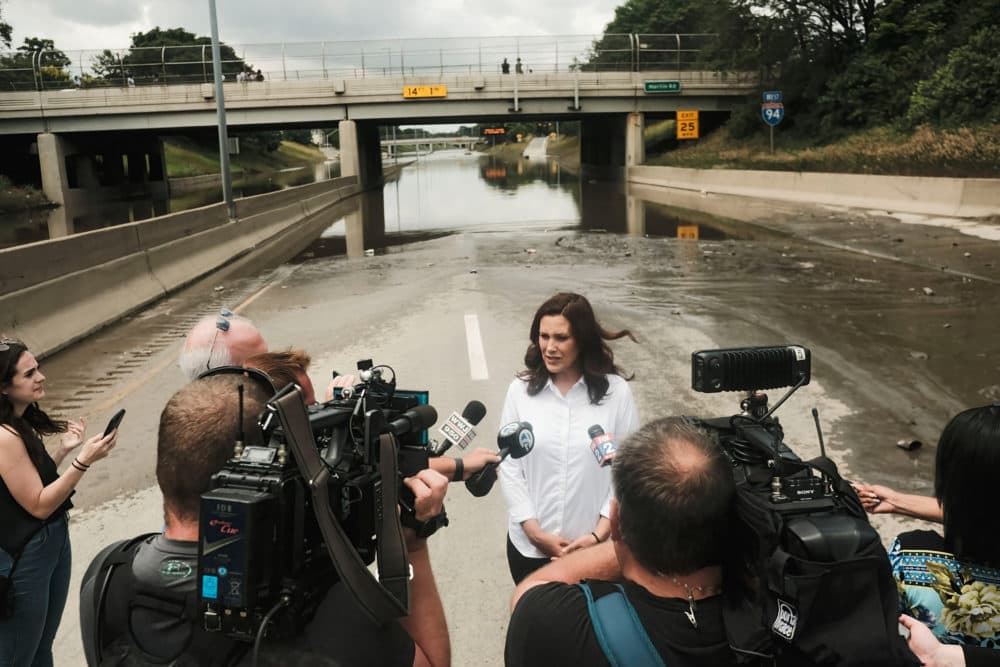Advertisement
Commentary
Media Coverage Of Climate Change Is Improving. But That Alone Won't Stamp Out Disinformation

President Joe Biden spoke bluntly this week about the unprecedented weather conditions in the Pacific Northwest, stating “climate change is driving the dangerous confluence of extreme heat and prolonged drought.”
The media often fail to make the connection that Biden identified between climate disruption and severe weather. Most of the reporting on the dozens of shattered temperature records in June neglected to mention that the warming climate helped create the conditions for those extremes to occur.
We can put a finer point on that thanks to Media Matters, a media watchdog group. They reported that only 17 percent of news segments about the dire conditions in the Pacific Northwest airing on the major cable networks mentioned the linkage to climate change. The broadcast networks did better, making the connection in almost a third of their segments.
Although that’s not as frequently as one might hope for, it’s a big improvement over recent years. In 2018, just one out of more than a hundred monitored reports about a major two-week heatwave referenced climate change.
But do the media drive beliefs about climate change, or do they merely align their content with the prevailing political views of their audience?
Another encouraging data point came from the Media and Climate Change Observatory, which noted that newspaper coverage of climate-related matters worldwide was markedly greater this past spring than in 2020. Some of that increase is attributable to news industry projects such as Covering Climate Now, which endeavors to elevate climate stories above the noise of the news cycle.
The media’s attention to climate change has risen over the last decade in step with the increasing public awareness that it is indeed happening and is human-caused. The Yale Program on Climate Change Communication (YPCCC) has tracked the public’s attitudes since 2008, and their data show this trend clearly.
But delving deeper into YPCCC’s data reveals that acceptance of climate change is not growing equally across the political spectrum. Republicans are actually a bit less likely to believe human activities cause climate change today than in 2008, while the fraction of Democrats accepting human causation has increased substantially over the same period.
Advertisement
That divide along party lines calls into question the ability of media coverage to influence opinion about climate change.
Tucker Carlson’s program on Fox News, the most-watched “news” program on cable, recently featured a guest who professed that climate change is just a fabrication of the liberal media. Overt climate change denial is also pervasive in the comment threads of Fox’s weather-related stories. Meanwhile, left-leaning networks like MSNBC regularly run segments on the seriousness of the climate crisis.
But do the media drive beliefs about climate change, or do they merely align their content with the prevailing political views of their audience?
The cause and effect relationship between media coverage of climate change and what people believe about it has been the subject of academic study. One paper published in the journal Climatic Change in 2014 concluded that “partisan media tends to reinforce and solidify the pre-existing worldviews of audience members who share the partisan slant of the media outlet.”
What that research is describing is more commonly known as an echo chamber. Rather than thinking about a causal relationship between media coverage of extreme weather and public views on climate change, it’s more helpful to think in terms of positive feedback loops that tend to amplify political polarization. Social media platforms throw gasoline on that fire by ensuring that readers only see content that conforms to their beliefs.
Another study by the same authors determined that political biases once again neutralize the information content of news items about new findings in climate science. Conservative media outlets have conditioned their audiences to distrust climate scientists who present evidence supporting the widely-shared consensus on global warming. Unfortunately, this manufactured prejudice works against the recently maturing ability of scientists to quantitatively assess the degree to which climate disruption increases the probability and severity of particular extreme weather events.
People in power ... must be held accountable for the policies that have fostered the brutal heatwaves of the long summer that has only just begun.
So the evidence suggests that the agency of media outlets linking extreme weather to climate change is subordinate to the power of political identity to govern the formation of opinion.
Responsible journalists must continue to conscientiously cover the climate crisis as its urgency demands, and it’s beneficial for them to prod our awareness of how climate change threatens so many aspects of human existence.
But the attribution of natural disasters to climate change by itself won’t be enough to surmount hardened political biases and break cycles of reinforcing disinformation. People in power — and the monied interests that support them — must be held accountable for the policies that have fostered the brutal heatwaves of the long summer that has only just begun.
